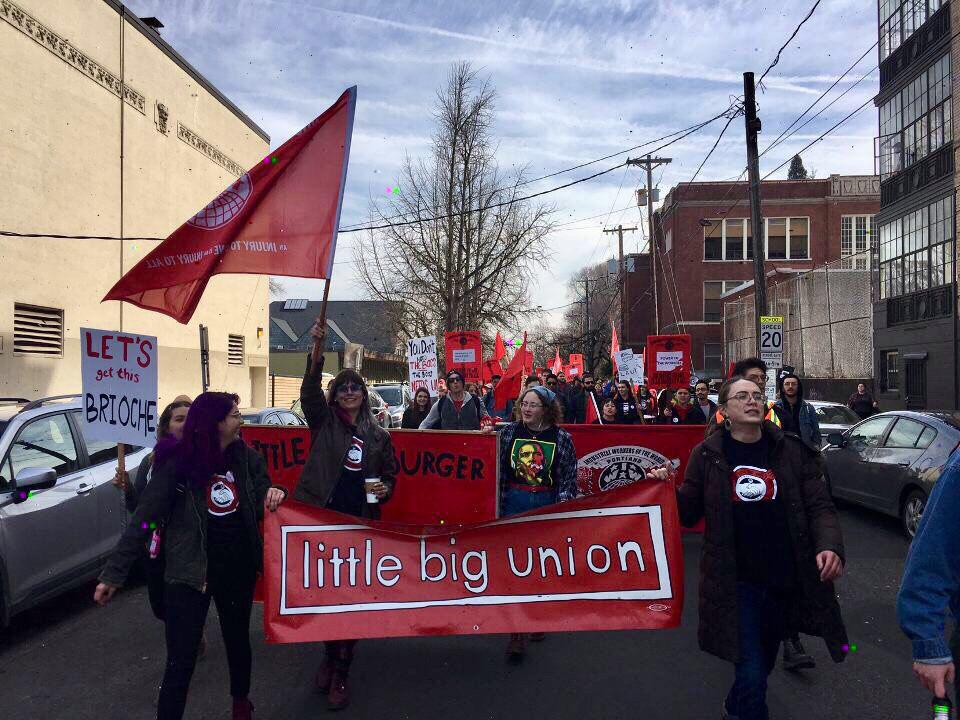
Photo via Little Big Burger
Workers across Little Big Burger locations in Portland announced the formation of a union on March 16. Their decision followed landmark action by Burgerville employees and reflects increased effort to unionize restaurants across the country.
Little Big Burger was founded in Portland in 2010 and currently has 18 locations, mostly in Oregon. In 2015, Chanticleer Holdings, which owns Hooters and other restaurant chains, purchased the brand. Little Big Burger has since expanded to Texas, North Carolina, and Washington.
Little Big Union has ten major demands for the business. Among them are increased wages, including a $5 universal raise plus extra for working holidays; necessary safety equipment with “timely” repairs; and more consistent schedules where, as union member Cameron Crowell describes, employees aren’t forced to work “either super long shifts that are incredibly tiring and painful or… two hour shifts where it’s the same amount of time to travel to work as you’re working.” He also mentions that employees who were promised 30 hour weeks have had their shifts halved.
Soon after the announcement, managers made policy changes, such as providing gloves for the safety of employees. But still, Crowell says, “Without a union, all the bosses’ concessions and all the boss gives you can be taken away at a moment’s notice, because they are not held to any contractual obligation to continue to negotiate with you.”
Chanticleer responded to the announcement on March 19, refusing to recognize the union and instead calling for an election of representation among Little Big Burger staff. “We are not, and have never been, ‘anti-union’,” wrote representative Jason Assadin a letter to Portland Mercury. “We do believe however, that this is an important decision and not one that should be made lightly.”
The next day, a Facebook post by the Little Big Union accused corporate of ignoring their “basic request to not disparage their workers or engage in union busting” by removing pro-union posters from breakrooms. In response, Chanticleer Holdings’ Regional Vice President, Adrian Oca, defended the decision by citing an existing non-solicitation policy.
Crowell says he had never heard of this rule prior to the removal. “In practice, there was no solicitation policy,” he says. “Every store has posters up in the back, [and] managers will even put up drawings.” On April 2, an email from Oca to employees retracted opposition to union posters in break rooms.
Tension between corporate and employees are high. A March 22 Facebook post accused management of punishing a worker for their union involvement, although the charge officially concerned a “bad job closing the store the night before.” Crowell too includes being written up as a possible consequence for advocacy.
Little Big Union could become the second federally recognized fast food union. The first, the Burgerville Workers Union (BVWU), formed in April 2018 and has frequently clashed with their parent business. In the lead-up to a recent vote at Montavilla, they accused Burgerville of trying to influence employees, offering raises and posting anti-union posters. Little Big Union has tried to dissuade a similar approach from Chanticleer Holdings, calling it “a dangerous and expensive path.” Burgerville has faced boycotts as a result of their actions.
The BVWU provides a rare blueprint, as restaurants across the country have been slow to unionize. Crowell identifies a lack of precedence, high turn-around of jobs, and low perceived value as the causes. “There’s a lot of conservative narratives that make fast food workers devalue [themselves],” he says. “I think that everyone should have a union, [everyone] should have a voice at the workplace, and everyone should have a living wage, and that’s why I think that this is so important.”
A vote for the union is not yet scheduled, as of April 8.

































